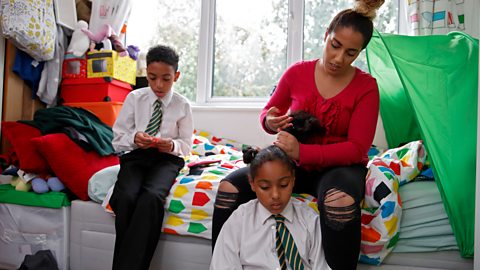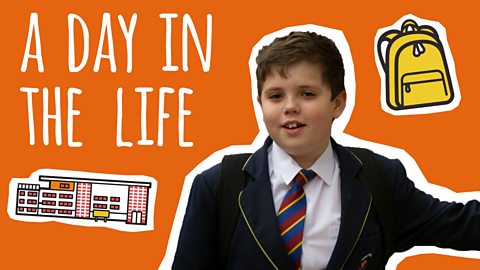By Matt Burton, (aka Mr Burton) secondary school headteacher

It’s awkward – a page of quadratic equations or past participles of Spanish verbs stare back at you from the kitchen table and you’re stumped. Your child is flummoxed and can’t get their head around it, and they’ve come to you for salvation because they're certain that ‘parents know everything!’
The tough thing is to accept that we, as parents, don’t always have the answers. It starts in those first moments of parenthood as the tiny baby in our arms screeches and the panic sets in. ‘AAARGH! What do I do?’ Fast forward a few years and our academic credentials are being put through their paces by a simple piece of homework.
91»»±¨work isn‚Äôt intended to frighten parents though. It‚Äôs designed to embed learning, to encourage routine, and to support children to learn and remember more - away from the classroom.

It comes in many forms – it could be pre-learning (where a child might need to read over some material before the next lesson), it could be continuing the work done in the lesson to confirm and embed what they’ve learnt that day, or it could be a standalone task (maybe an exam question or an essay), needing your child to recall their learning from lessons and stretch their brain to remember work from the past.
But, of course, parents have an important role to play (and not just as the last, desperate port of call) in a successful homework journey. So, if you’re struggling to juggle childcare and cooking dinner with a Business Studies exam question on the marketing mix, then here are five top tips which will (I hope) help you to navigate the homework jungle and make it out the other side (and you might even learn something along the way!).
Let go of perfection

First things first: it’s okay to not know the answer. Many a parent has, at some point in the last 18 months of home schooling and remote learning, scratched their head and wondered about what a piece of work means. Lessons can go from phonics to phonemes to phlebotomy to pharaohs from ancient Egypt at an alarming pace. Children - given it’s their routine to change lessons from hour to hour - can adapt quickly, but for a parent to be able to dip in and out and master it all, it’s almost impossible. Also, school is supposed to be a challenge and work should push children to stretch themselves academically at all levels. Don’t expect to know everything - though you might just surprise yourself with what you do know!
Things have changed!

Please don’t take this the wrong way, but things have changed since you (and I) attended school as a student! Some knowledge remains exactly the same, but the concepts of the curriculum, what’s expected at certain levels, how it’s delivered, teaching methods and the depth of knowledge expected - these will all have changed in the vast majority of cases. If your child is working through something and you've got an alternative way of working it out, which you think would be much, much easier…try and restrain yourself and instead learn the ‘new’ way of working it out! Other methods could be confusing to your child, and whilst you might think it’s much better, there could be a million reasons why it’s being taught in that way.
Don't be afraid to ask!
Absolutely nobody wins if the homework doesn’t get done. As we’ve already said, it’s supposed to be helpful and supportive to your child’s learning. If they (and you) have strained every sinew to complete it and you’re drawing a blank…then that’s okay. Nobody would ever ask anything more of them. If that happens, get in touch with your child’s teacher with a note, a call or an email to let them know that they might need a little help. With a two-minute teacher chat the day after, it might open the floodgates and help the homework flow!
Plan, plan, plan…

Life is incredibly busy nowadays, and one of the ever-growing challenges is Organisation. The school will have a policy for homework on their website that should tell you how many pieces will be set, when for and whether it’ll be online, mixed, or all in exercise books. With homework being set regularly and being expected in on different days, make sure your child uses their homework diary to plan when (and how) it’s going to get done. If they’ve got a mobile phone, setting reminders in their phone calendar - to plan completion of tasks - will help set the expectation that this is important…and that you’re helping them to help themselves.
Location, location, location
For homework to be done well (and for the intended learning to be achieved), it‚Äôs important that it‚Äôs done in a place where your child can concentrate and where they‚Äôve got the right equipment. Spaces to work should be light, airy and quiet, with natural light flowing in. For loads of reasons though, sometimes that‚Äôs easier said than done. So if they don‚Äôt have a quiet, calm place to work (or need a computer and don‚Äôt have one), then you can speak to the school. 91»»±¨work clubs and after-school help will be very likely available, with teachers and staff on hand to point your child in the right direction and set sail for success!
But at the end of the day, what’s the most important thing? It’s very, very simple. Do your best. That’s all the school will ask. By just being there, taking an interest, checking in and talking to your child about their homework, you’re already doing a great job. And if they don’t do their homework, a little word in their ear to remind them to do it can go a long way to help them see that school and home are working together, and so they need to make sure it gets done! In the vast majority of cases, your child will confidently work through their homework without throwing a page of equations at you - but if they do, I hope you can take a breath, do your best, and get it done…together!

More from 91»»±¨ Bitesize Parents' Toolkit‚Ķ
Parents' Toolkit
Fun activities, real-life stories, wellbeing support and loads of helpful advice - we're here for you and your child.

Headteacher Matt Burton: What to expect if your child is returning to secondary school
Educating Yorkshire's Matt Burton has the lowdown for parents on how schools will look this year when students return to class.

Parents' Toolkit: Back to School. collection
Advice for parents on helping children adjust to a new school year. With practical tips and support around resilience and mental health.

Year 7: A day in the life
Follow Alfie through a typical day in Year 7.

Myths about secondary school
Are all teachers strict? Are the older students out to scare you? And what is the canteen really like?

